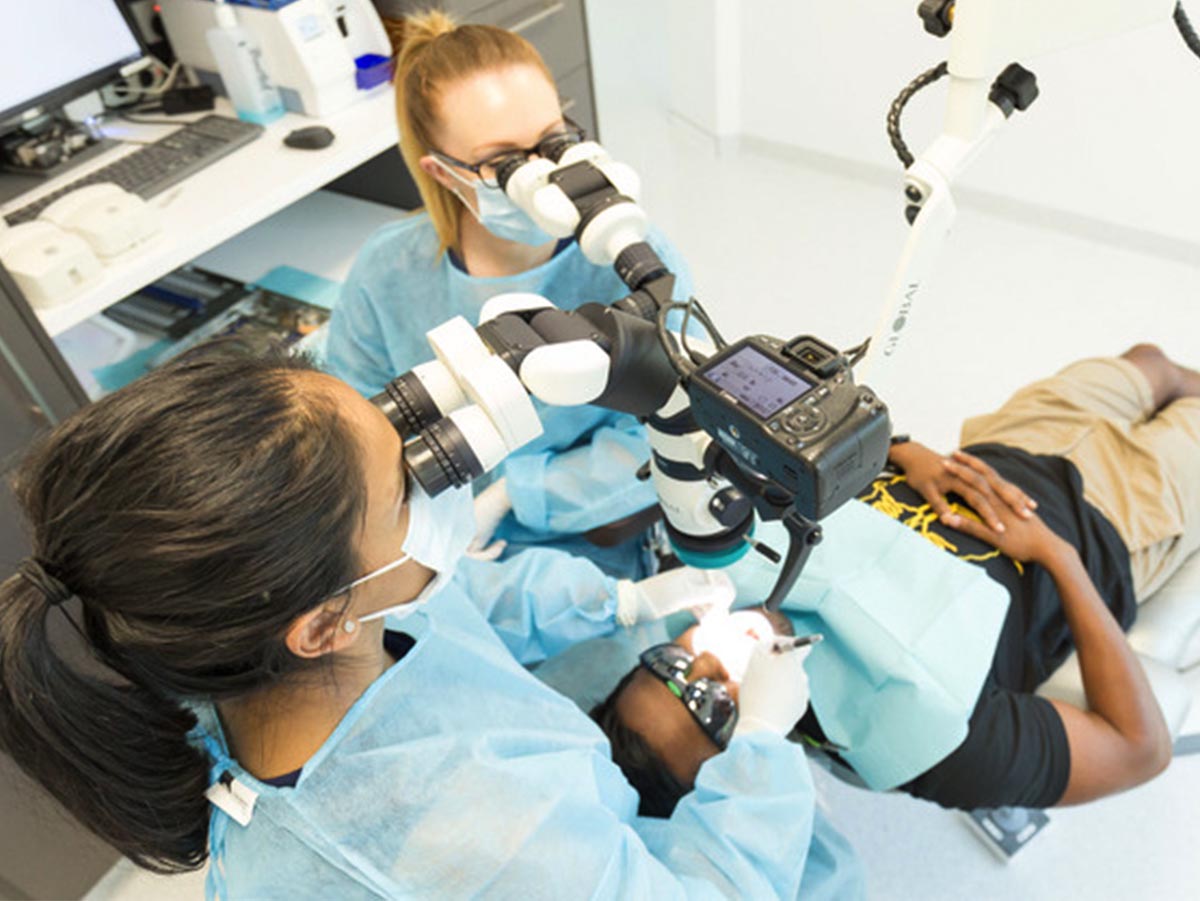What is an Endodontist Specialist?
In Australia, an endodontist is a specialised dentist who undertakes additional, post graduate training at university beyond dental school. Their training focuses on diagnosing tooth pain and performing root canal treatment and other pulp damaged of infected procedures. By undergoing this training, an endodontist will specialise in extensive tooth and tooth pulp pain treatment.
What is the difference between an endodontist specialist and a general dentist?
Both a general dentist and a specialist endodontist are dental care professionals, but there are many differences that distinguish between the two professionals. The biggest difference between a general dentist and an endodontist, is that an endodontist specialises is the level of expertise and knowledge that is gained in the area of root canal treatments.
A general dentist undertakes 5 years of dental training and becomes a primary care provider for individuals of all ages, performing general dental procedures to maintain oral health. Some procedures a general dentist may perform include, filling a cavity, fitting crowns and bridges, teeth check-ups and teeth cleaning.
The maintenance of one’s oral health is incredibly important and general dentists are often tasked with helping their patients maintain their oral health.
An endodontist specialist is a dental specialist who specialise in treatment of damaged dental pulp of the tooth. General dentists can also perform pulp damage treatments, such as root canals, but an endodontist specialist is limited to only treating damaged pulp tissues and thus, perform these treatments on a more regular basis. An endodontist specialist often performs extensive treatments such as, root canal therapy, fixing cracked teeth, managing trauma, dental implants, regenerative endodontic procedures, internal bleaching, root canal re-treatment and root end surgery.
Endodontist specialists also use specialised techniques and the most advanced technology to ensure their patients are comfortable during their experience and to ensure that restoration of every patient's tooth problem is adequate.
Endodontic Care Treatment
The most common endodontic treatment performed by endodontist specialists are root canals. This is a commonly performed dental treatment that has documented success rates of over 90%. A well-performed root canal will allow a tooth to function normally, and retain its natural look, saving the tooth from extraction.
At a tooth’s centre is the pulp. The pulp is made up of blood vessels that help build the tooth. The pulp can be harmed and affected by events such as dental trauma, deep decay, cracks and chips, or repeated dental procedures. A root canal treatment will remove the diseased pulp, clean and seal the root canal system and minimising all tooth pain. Specialist Endodontic care will also often offer “happy” or nitrous oxide gas and IV sedation for dentally anxious patients.

Phone: 02 9680 4311
Fax: 02 8850 6186
Email: info@australiandentalspecialists.com
Address: Suite 219, 4 Columbia Court, Norwest, Sydney, NSW 2153
Practice Hours
Monday to Friday - 8.30am to 5.00pm
Weekend times are available by appointment.
Payment Methods
We accept Cash, Cheque, Visa, MasterCard and Eftpos.
Parking
Visitor parking is available in the building and plenty of free on street parking is usually available too.
Public Transport
Bus services (North-West T-way bus services 2007) run along Norwest Boulevard, a short walk to the practice.
A train service will be available in 2019.

Other Root Canal Therapy Procedures
Cracked teeth demonstrate many types of symptoms, including pain when chewing, temperature sensitivities, or even the release of biting pressure.
Root canal therapy is a conservative procedure undertaken by an endodontist to save teeth. It is a commonly performed dental treatment and has documented success rates of over 90%.
With regenerative endodontics, we revive or regenerate the tooth’s natural tissue so the root can continue growing, be functional and last you for your lifetime.
Internal bleaching, also referred to as walking bleach, is a technique that is used to whiten the appearance of teeth. Internal bleaching is conducted under the direction of a dentist.
Root end sugery or apicoectomy is the most common surgery used to save damaged teeth. Occasionally, root canal therapy will not be sufficient to heal the tooth and your endodontist will recommend surgery.
There are cases where a tooth that received root canal treatment may fail toheal or pain may continue to exist. The failure can occur months or years after the intial treatment.
